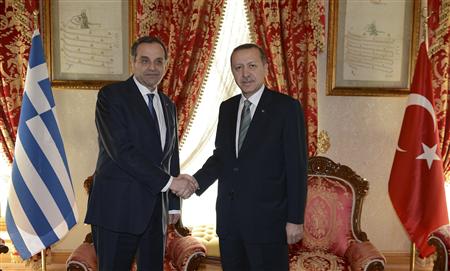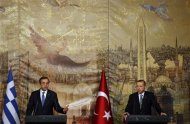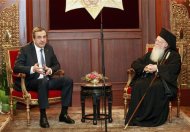Greece, in trouble elsewhere, boosts cooperation with Turkey
By Ayla Jean Yackley | Reuters
ISTANBUL (Reuters) -
Beset by economic crisis at home, Greece took a symbolic step towards
improving relations with long-time arch rival Turkey on Monday by pledging to double annual trade with its eastern neighbor over the next three years.
Greek Prime Minister Antonis Samaras, on his first visit to Turkey since winning power in June, met his Turkish counterpart Tayyip Erdogan in Istanbul and signed deals on issues from agriculture to disaster relief.
They set a target of $10 billion in annual trade by 2015.
The Aegean nations
have long been embroiled in disputes over territory, energy exploration
and the divided island of Cyprus, but Greece's main priority now is boosting an economy which has shrunk about 20 percent since 2008.
"Today is a good day for Greek-Turkish relations,
and it's in our hands to have more of these good days," Samaras told a
news conference in Turkey's largest city Istanbul, saying the two sides
were carefully building trust.
"There are still issues we do not agree on and our
disagreements may be significant, but ... we are trying to create
relations of mutual respect," he said after a meeting that included more
than 20 cabinet members from both sides.
The two NATO
members were nearly drawn into a military clash as recently as 1996 over
an uninhabited Aegean islet, and fears of conflict have driven high
levels of Greek spending on defense that Athens can no longer afford.
Ties between the two neighbors improved after 1999,
when earthquakes in both countries led to spontaneous deliveries of aid
and prompted their leaders to begin dialogue. Trade has grown strongly
and amounted to $5 billion last year.Greece is the fifth-biggest foreign investor in Turkey, with its direct investments totaling $6.5 billion between 2002 and 2011, Erdogan said. Around 1 million Turks and Greeks visit each other's country each year.
CYPRUS PROBLEM PERSISTS
Erdogan reinforced the sense of a thaw in relations.
"We believe the constructive atmosphere between our countries, the mutual understanding and good neighborliness will strengthen our ties further," he told the news conference.
Erdogan also emphasized that better relations between the neighbors boosts stability in the east Mediterranean.
While Athens backs Ankara's European Union bid, the failure to reunite the divided island of Cyprus has stood in the way.
Turkey
invaded Cyprus in 1974 in response to a Greek Cypriot coup aimed at
uniting the east Mediterranean island with Greece. Turkey keeps some
30,000 troops in a Turkish Cypriot enclave that only it recognizes.
"We want to bury the Cyprus problem in history,"
Erdogan said. The Greek Cypriot Republic of Cyprus joined the EU in
2004.A dispute over Aegean energy exploration is also flaring up, with Samaras suggesting Greece wants to demarcate the areas beneath the sea in which it hopes to find oil and gas. Turkey warns against any unilateral moves.
Other problems include Ankara's objection to the Greek state's involvement in the appointment of religious officials, including Islamic clerics, and stalled plans for a state mosque in Athens where an ethnic Turkish Muslim minority lives.
Turkey's refusal to reopen the Halki Greek Orthodox seminary on an island near Istanbul is another bone of contention.
Critics also accuse Turkey of interfering in the affairs of the Greek Orthodox church in Istanbul, although church officials have praised government moves to improve some rights.
"Enabling minorities in the two countries to live a prosperous and happy life will undoubtedly strengthen our friendship," Erdogan said.
At the meeting, ministers signed 25 deals on areas including agriculture, health, transport, media, immigration, disaster relief and more. A Turkish diplomatic source said they were largely pledges of goodwill to deepen cooperation.
"Historically Greek-Turkish relations have been difficult, we were like cats and dogs," he said.
"This meeting is the expression of the political will on both sides to see this relationship fulfill its potential. We have differences but there is a desire for a positive agenda."
(Additional reporting by Renee Maltezou in Athens; Writing by Daren Butler; Editing by Nick Tattersall/Mark Heinrich)



No comments:
Post a Comment